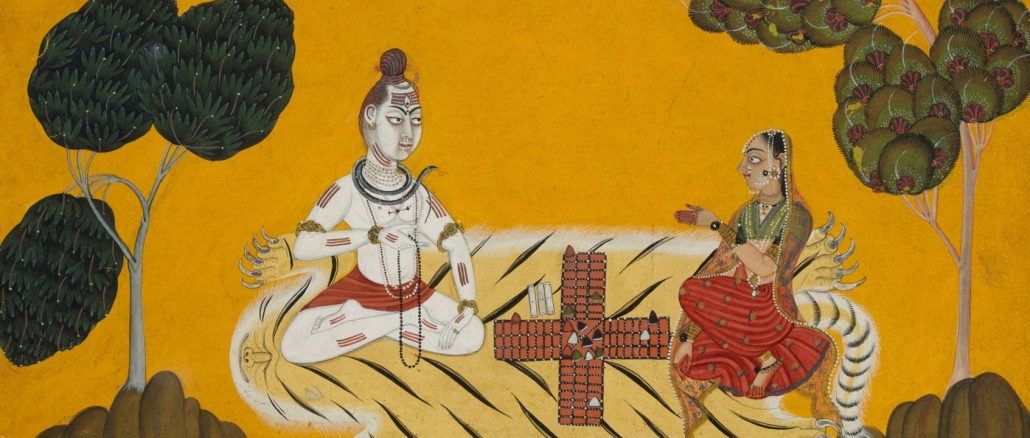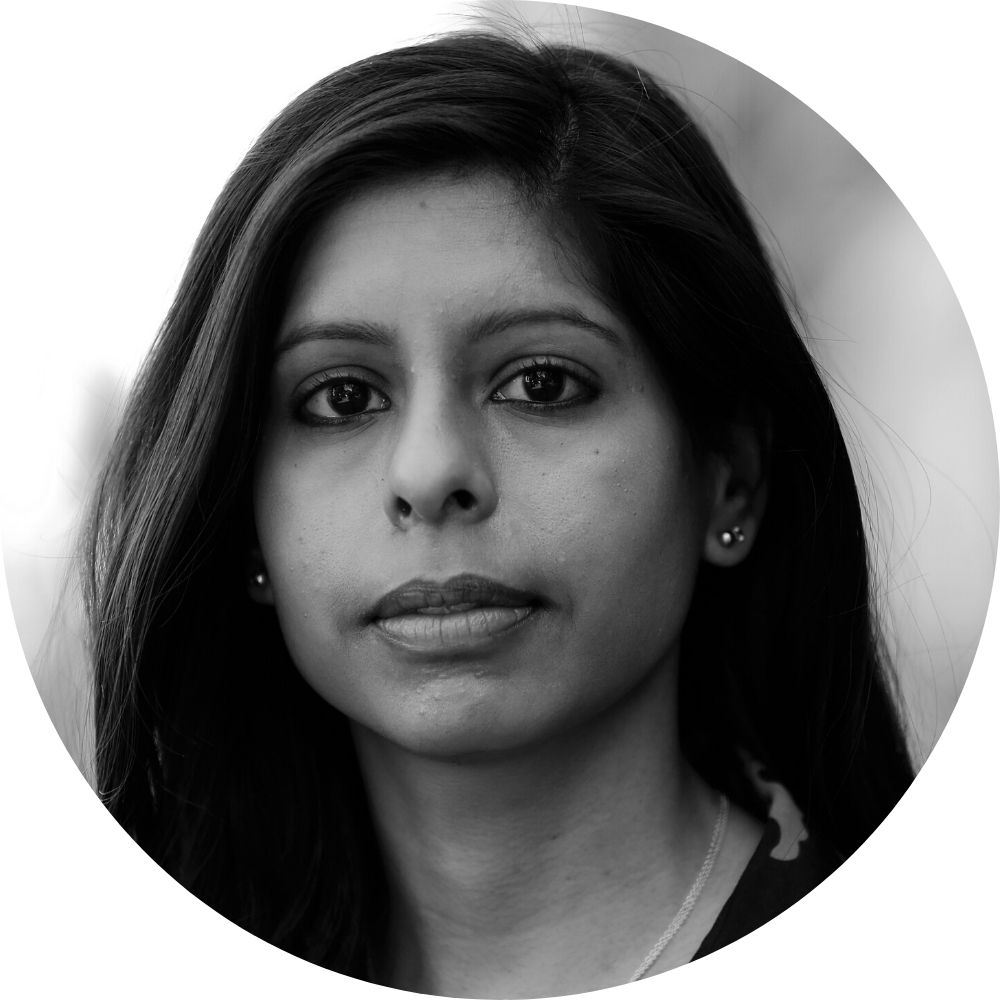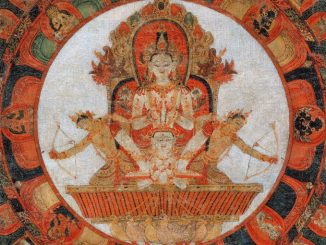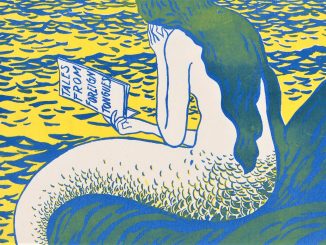
Amma chose my name after going to the Shiva temple in Trichy, which held within it Akhilandeshwari’s shrine. She loved that mandir: it was one of five Shiva temples in Tamil Nadu, each of which represented a different element. This one symbolized water, an object of worship for its cleansing, life-giving force.
My mother went to pray for my health, and for hers, fragile as I was in her womb. I imagine her in a cotton saree, wide glasses and long braid, circling the idols nine times — a sacred number in Hinduism. It gave her peace and solace when I was growing in her belly. Perhaps Amma already had a nagging feeling that something was wrong, a worrisome inkling that called for much prayer. Later, I would be born a blue baby, with a heart condition that slowly seeped life from me. Amma’s worst nightmares manifested into reality.
This name was borne from that temple: it was a sacred prayer. And it was, above all, a name rooted in a mother’s love.
***
A few years later, my mother, my father, and I were transplanted from Trichy to Hyderabad to North Carolina, eventually finding our roots in suburban New Jersey, a place foreign and new to us.
In my new elementary school, I’d quickly grasped that to be foreign was not to be “cool.” Young as they were, the girls who commandeered control of the classroom and the playground were already what I yearned to be: pale skin, blonde hair, blue eyes. Some resembled the Barbie dolls that lined my room at home, still safely ensconced in their packaging — afraid as I was to damage them. Through sweet words with barbed edges, those girls denied me access to their exclusive clubs and inside jokes. When a new boy in school was nice to me, with his endearing doe eyes and floppy brown hair, I’d made the mistake of nursing an innocent young crush. Eagerly, I’d take a seat next to him, or try to tag alongside him outside at recess. Later, it turned out that he, and the popular girls, were giggling at me behind my back. My mismatched clothes, “smelly” school lunches, bushy eyebrows, and strange accent branded me as something too foreign to love.
Very early on, I’d understood that to be white was to be desired. I was desperate, from the beginning, just to belong — and that meant keeping my Indian identity under wraps at school. As I grew older, I quietly observed that those Desi girls who ranked high on the elusive popularity scale had done the same. They had hidden their roots, burying their black hair within streaks of blonde and brown. Their eyes transitioned from dark brown to green, concealed by colored lenses. Their names, too, were cut short: “Nikita” became “Nikki” and “Jayasree” was “Jay.” In lieu of bindis and kurtis, they donned Abercrombie and Hollister t-shirts, exchanging their Indian accents for “American” ones.
I couldn’t escape those messages at home either, when I was given Fair and Lovely cream to help make my dark skin a little “brighter” and to “improve my complexion.” When seeking friendship felt fruitless, I turned to books, losing myself in our suburban library. Yet, what I found there — stories like Sweet Valley High about a set of popular, blonde twins — only reinforced that whiteness was the ideal. Girls like that were instantly beloved. For me, it felt impossible, unless I dressed like them, acted like them, and removed any trace of where I came from.
And so, I soon grew to split myself in two. The immigrant child knows this well: you must divide yourself to survive.
What did it mean to be “American”? I was slowly coming to equate it with one thing: assimilation. To get as close to whiteness as possible, to absorb it, and ultimately — to lose some parts of myself in that process.
***
Coming to our home in suburban New Jersey, you feel transported to India. Our driveway is adorned with a traditional muggu, a pattern drawn in chalk. Stepping across the front door’s threshold, you pass under a garland of mango leaves. In the kitchen, my parents cook up a storm, my father breaking open a coconut on the deck, capturing the sweet water as it breaks open. My mother is inside, stirring hot sambhar on the stovetop, with steaming hot idlis ready in the pressure cooker.
On puja days, the ladies in the neighborhood stop by to pay their respects after the sun sets. Their silk sarees glisten and their gold jewelry glitters, as compliments abound, ricocheting across the room. We pass around tart lemon rice and prasad from the puja: sweet payasam made of milk, rice vermicelli and cashews. Everyone gathers in the living room, some ladies sitting on the couches, and others on the floor. Amma asks me to grace the group with a carnatic song, and I oblige, despite my embarrassment.
On weekends, I attend a Hindu school at a local ashram — which is, strangely enough, led by a white guru who turned from a career in computer programming to a life as a swamiji. We learn about Hindu mythology and sing bhajans in Sanskrit and English verse. The swami strums his guitar and leads us in group sing-alongs.
The girl I was at home had a distinctly Indian accent, switched between Telugu and English, relished idli and sambhar, and spent weekends learning carnatic singing, keeping the beat with her fingers and palms.
Outside the home, I presented a version of myself scrubbed clean of any hints of “Indian-ness.” I replaced my Indian accent with an amorphous one that was more difficult to place. As I entered my teenage years, I turned to shopping at Hot Topic, dying my hair pink and wearing far too much black. When I wasn’t practicing Carnatic songs, I was at concerts with punk or metal bands that passed off screaming as music, surrounded by guys with mohawks or liberty spikes – something I had no taste for, but seemed to reflect my inner alienation well. Though laughably typical in many ways, this way of dressing, of acting, was also an attempt to claim some space for myself. I knew I’d never be the “popular” girl, and so I took myself out of that race altogether. If I couldn’t be beautiful and coveted, at least I could set myself apart in some way, while hiding any sense of my beauty in plain sight.
***
In India, my name felt grounded — in earth, in soil, in the world.
Yet, my name means something otherworldly: Supreme Goddess (“-Eshwari”) of the universe (“Akhila”). Its meaning is expansive, though its pronunciation does not at first betray that.
Akhilandeshwari is one of the many names of Goddess Parvati, the wife of Lord Shiva. As the myth goes, Parvati was born divinely ordained to love Lord Shiva. A young woman, she was fully devoted to the God, insistent on marrying him. She went to meet Shiva in the foothills of the Himalayas, where he was deep in meditation. There, she asked if she could serve him — and he agreed. She gathered flowers for him to conduct his pujas, and waited on his every need. But Shiva continued his penance, showing no interest in Parvati.
Frustrated, Parvati decided to leave him to retreat to the forest herself. Immersing herself deep in meditation, she endured the weather’s changing hardships: snow, heat, and storms. Slowly, she grew in strength, coming to understand her own divine reality. She became so powerful that she no longer needed food, water, or air to sustain herself. Her meditations generated such energy that they began to heat up the earth; she brought the universe to the brink of burning. Shiva, then, finally came to take notice of Parvati. He fell in love with her not through her subservience to him, but when she finally became his equal, so potent in her asceticism that her meditative state shook the world to its core.
As I grew into a woman, my limbs lengthened and my body budded into something more dangerous. Yet, I was always timid, having been groomed to be quiet, to downplay myself, to be pliant and compliant. I lacked the self-esteem to believe in myself, in my voice, in my heritage.
When people I met asked me that innocent question, What does your name mean?, I had to answer. I often hesitated to state the truth — that I was named for the Goddess of the universe. That response seemed to me to reek of a certain arrogance; how could I claim the whole universe to myself? It felt like too much for the meek girl I was.
Yet, in moments when I wanted nothing more than to shrink into myself, this name forced me to stand tall, to call my feminine energy forth. Owning up to my name’s meaning required something else — it demanded of me that I take up space. That I claim the full power, the energy, the shakti deep within my name.
***
Along with my two selves came two pronunciations of my name: the Indian, and the “American.”
In Telugu, my name is pronounced with an emphasis on the first syllable. The consonants are strong, solid; the vowels are shorter, sweeter, rounder.
In New Jersey, my name was suddenly transformed in the mouths of people who did not look like me, who did not have my melanin. White people liked to call me Ah-kee-lah. Like that movie, Akeelah and the Bee, they said with a knowing smile, as if they were privy to some truth about me. They liked to elongate the vowels, languidly draw the word out. The name was loosened, opened up to the air.
Yet, though it was wrong, that is the version that stuck. To my ears, the name sounded more mellifluous, more elegant. I lacked trust in my own culture, my own language, our own traditions. I was too afraid to defend it. The “American” way had to be the better way, right? Rather than questioning it, I adopted it for my own.
***
In 2018, a reader wrote to Dear Abby with a question: his wife, who was Indian, wanted to name their children Indian names. The husband, in turn, believed that giving their kids so-called ‘unusual’ names would make their lives more difficult as they grew up in America. He sought Abby’s advice: how could he convince his wife that choosing “Western” names for their children would be a better option?
In response, “Dear Abby” agreed with the reader, suggesting that “foreign names can be difficult to pronounce and spell, but they can also cause a child to be teased unmercifully.” She noted that a name that “sounds beautiful in a foreign language can be grating in English.” Why, she asked, “saddle a kid with a name he or she will have to explain or correct with friends, teachers and fellow employees from childhood into adulthood?”
Dear Abby’s advice ignored the fact that names, and their pronunciation, have a deep significance in many religions of India – Hinduism, Sikhism, or Islam. Her answer reflected the view that whiteness defines America, and everyone else must mold to fit that structure, that dominant culture, to be considered as belonging in this country.
But in the Trump Era, Dear Abby’s advice sounds an alarm about the increasing number of Americans who feel this way – that people of color and immigrants must fully assimilate to be truly “American.” These white Americans are threatened by a display of culture and language – because they see it as a threat to their whiteness and cultural and political dominance. This form of oppression calls for whitewashing our heritage and our very selves, because that is the only palatable way of being an immigrant in America.
These views are causing a worsening backlash against immigrants and minorities. In a charged political climate in which hate crimes are increasing, people of color are more frequently attacked for speaking languages other than English. For instance, in 2018, Aaron Schlossberg, an enraged white lawyer, yelled at employees and customers at a restaurant in New York for speaking Spanish. “This is America!,” he says, threatening to call ICE to have them “kicked out” of the country. “If they have the balls to come here and live off my money. I pay for their welfare, I pay for their ability to be here. The least they can do…is speak English,” he ranted.
For racist white men like Schlossberg, immigrants must be thankful to be here, and to show that gratitude, they must erase their identities and fully assimilate. No wonder that a generation of children like me have grown up assuming that hiding our heritage was the only way to survive in this country. That changing the way we look, the way we speak, the way we pronounce our names — to be more palatable to white people — was necessary to be accepted. No wonder that I, and so many immigrant kids, felt deep down that embracing our true selves could be dangerous: it turns out that twenty years later in 2019, it very much is.
***
A-u-mmmmm. Amma hums deeply, the “om” coming from deep within her. Softly, I join in. With our eyes closed, the vibrations together feel powerful, thrumming like the strings of an invisible guitar.
In Sanskrit, sound is of great importance, and aum is the most potent of all. This sound was present at the universe’s creation, and when we chant it today, it connects us with that very core.
The Vedas drew from an oral tradition before they were ever enshrined in writing. A word is not just a word; its pronunciation creates specific vibrations, energies in the human body. The sound created is sacred, reflecting an object’s very essence.
My name, too, has a particular pronunciation, a crucial meaning in Sanskrit. By forsaking that, I have been eroding its meaning and my own sense of self.
***
With ammamma, my grandmother, I listen to the lyrics of the song, Akhilandeshwari Rakshamam, sung by the renowned carnatic artist, M.S. Subbalakshmi. Her songs often linger in the background of my childhood memories, my grandparents humming along to her fiercely passionate, devotional lyrics.
Ammamma breaks into the plaintive strains of the melody, echoing its beauty, a tribute to the Goddess. The song is like a lullaby, its tones warm, sweet, and soft. It is the tone in which my grandmother sings it to me that catches my breath for a moment, tinged with the deepest love and care, leaving tears in my eyes.
These generations of women birthed me, nursed me, and bestowed this name upon me. My name holds within it their history, their legacy. As I listen to this song again, years later, it helps me begin in earnest the unraveling — of years of shame, of hiding a real self, of desire to be something else — to reveal and reclaim an energy, that power nestled within my name, within my bones. It is an unraveling that begins now, but may well occupy a lifetime.
AUTHOR
Featured image: Devidasa of Nurpur, “Shiva and Parvati Playing Chaupar: Folio from a Rasamanjari Series,” opaque watercolor, ink, silver, and gold on paper, 1694-95. The Metropolitan Museum of Art.




1 Trackback / Pingback
Comments are closed.